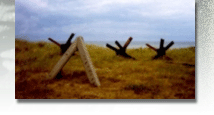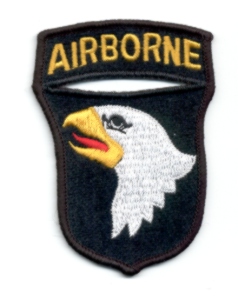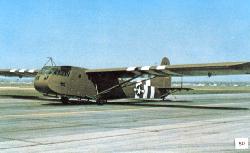Richard Bostwick 401 GIR 101st ABN Div.
Several hours passed before we arrived at Greenham Common Airfield, near Newberry. We were immediately briefed on the tactical problem we would simulate. This was to be the capture of an enemy airfield. After takeoff our craft was to rendezvous with other airborne elements of the battalion, we would shape-up and return to drop on our take off point. Upon landing we were to run like hell to the outer perimeter of the airstrip and dig in, covering those of our group still in the process of landing. I entered the glider to which I had been assigned and found that it would carry eight troopers for this maneuver, four on each side of the craft facing each other. Our gear lay on the floor between our feet. Having been preoccupied, I didn't realize that we had left the ground until I looked out and we were rising higher and higher. I felt rather uneasy, the craft appeared to be so flimsy as to fall apart at the least provocation. Beside me there was a large opening in the fuselage through which, by leaning slightly to my left and backward, I could lean halfway out of the craft. My safety belt held me securely in my seat. Soon our tow-plane began to circle and fall into line with many other gliders that had appeared, as if by magic, out of the blue. I should guess that we were probably at least 3,000 feet in the air. Shortly we were advised that the tow line would be dropped and we would descend to the objective, safety belt were not to be loosed for any reason. Suddenly our steady course was interrupted. The pilot of our craft had disengaged the tow and the craft rose sharply, turned slightly and damned near flipped over. When this occurred I was looking at the trooper across from me, his faced turned white and sheer terror was written all over him. I took a deep breath but felt no panic.
Observers on the ground reported that the near flip-over that our glider had experienced was the result of our pilot avoiding a collision with another glider. On May 20th, the battalion left Reading by truck. There had been so many dry runs in preparation for the invasion that we figured that it was just one more. As usual we were permitted to take only those possessions we would need in combat. Come to think about it, what did the army issue that wasn't designed for combat. Arriving at Camp Raleigh, situated on high ground, overlooking the City of Plymouth, I couldn't help but fee that this was it! The place was surrounded with heavy barbed wire, no one could comfortably enter without passing through the heavily guarded gates. An arterial roadway passed nearby and the army vehicle traffic was extremely heavy, yes sir, this appeared to be the real thing! June 1st, all leaves were canceled; only authorized personnel were allowed on the premises. All communications were suspended and guards patrolled the barbed wire fences. After breakfast, this particular morning, we were directed to a large tent, much like those found at the circus. Once inside our attention was directed to a large sand table upon which was a replica of the northern cast of France, the area known as the Cotentin Peninsula. All horseplay had vanished, this was now very serious. The shocker was the announcement that the 401st, our battalion, would hit the beaches. Headquarters Company would be the only element of the 401st to be airborne. Our initial objectives were to be two causeways, elevated roadways, leading inland from the beach. We would secure the causeways and set up road blocks near the village of Saint Marie DuMont. Extreme importance was placed upon memorizing the terrain, each road, each landmark. No excuse would be accepted from anyone becoming separated from the unit. After two days at the sand table we were told that our departure would take place on the morning of June 4th. One day remained to become more familiar with the topography of the French coastline,to again check locations, roads, intersections, where to turn right, where to turn left. Late on the 4th of June we set sail from Plymouth Harbor, in convoy. Instead of putting directly out to sea, our ship followed the coastline. Our moral was high, which isn't unusual, we were always up! Personally, I classified myself as a bitcher of sorts; even I was enjoying myself. After dark I hit the sack and went right to sleep. |

 On a beautiful morning in May, a fleet of trucks came booming into Brock Barracks and parked on the parade ground. All troops fell out in formation. Following a briefing we loaded up. Each truck carried a standing room load. We whooped and hollered as we passed through the outskirts of Reading, and each succeeding town. We were headed for an airfield and my first flight in a glider, in fact my first flight in any type of aircraft.
On a beautiful morning in May, a fleet of trucks came booming into Brock Barracks and parked on the parade ground. All troops fell out in formation. Following a briefing we loaded up. Each truck carried a standing room load. We whooped and hollered as we passed through the outskirts of Reading, and each succeeding town. We were headed for an airfield and my first flight in a glider, in fact my first flight in any type of aircraft.
 From that point on I felt that I knew what it must be like to ride on a feather. We soared gracefully through the air and began to descend to the landing strip. Minutes later we were skimming over the ground at a terrific rate of speed - wheels touched down and we coasted to a stop. Per previous instructions, I, together with the others leaped from the craft and headed for the perimeter of the field.
From that point on I felt that I knew what it must be like to ride on a feather. We soared gracefully through the air and began to descend to the landing strip. Minutes later we were skimming over the ground at a terrific rate of speed - wheels touched down and we coasted to a stop. Per previous instructions, I, together with the others leaped from the craft and headed for the perimeter of the field.